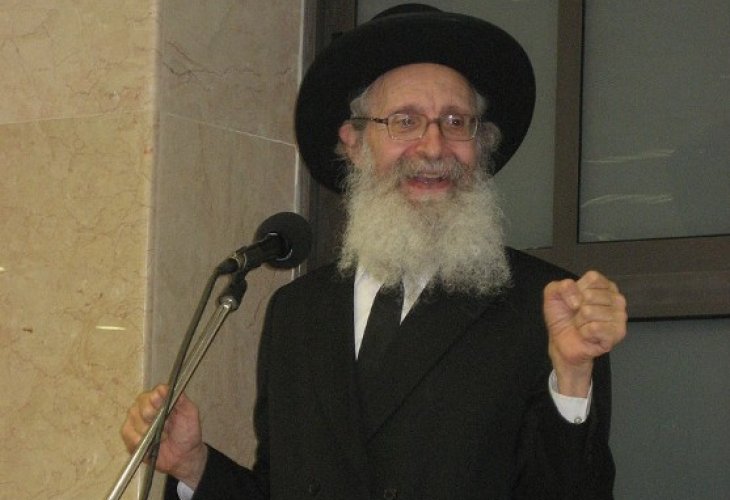Torah Personalities
Rabbi Nosson Tzvi Finkel: A Giant in Torah, A Father to Thousands
Thirteen years after his passing, we remember the beloved Rosh Yeshiva of Mir whose unwavering dedication and compassion transformed the Torah world

From Chicago to Jerusalem: A Heart Drawn to Torah
Today (Tuesday, the 11th of Cheshvan) marks thirteen years since the passing of Rabbi Nosson Tzvi Finkel, the Rosh Yeshiva of the Mir Yeshiva in Jerusalem and a member of the rabbinical counsel of Degel HaTorah.
Born in Chicago, Rabbi Finkel was named after his great-grandfather, the Alter of Slabodka. He attended a modern Orthodox high school and was first introduced to the world of Torah during a visit to Israel as a teenager. There, he met his relative, the late Rabbi Eliezer Yehudah Finkel, then head of the Mir Yeshiva. Though his parents were deeply opposed to his staying in Israel—offering him, at one point, a brand-new Buick if he would just return—young Nosson Tzvi was drawn entirely to Torah, and he never looked back.
He grew steadily in Torah and character, eventually becoming Rosh Yeshiva of Mir himself. Under his leadership, the yeshiva blossomed into the largest in Israel, and one of the two largest in the world, alongside Lakewood. Despite debilitating illness, he became a father figure to thousands and a leader whose vision reshaped the global Torah landscape.
Building an Empire Amid Tremendous Pain
At the age of 45, Rabbi Finkel was diagnosed with Parkinson’s disease, a progressive neurological disorder. From that point on, he suffered constant physical pain, often relying on a wheelchair. Yet he did not retreat. Instead, he poured his strength into expanding the yeshiva, raising funds, purchasing land, overseeing construction plans, and traveling abroad regularly to meet with donors.
Under his direction, Mir added two branches: one in Beit Yisrael’s Ramat Shlomo neighborhood in Jerusalem, and another in Brachfeld, a neighborhood of Modi’in Illit. The main yeshiva campus in Jerusalem came to span dozens of buildings in the Beit Yisrael neighborhood.
Though his condition steadily worsened, Rabbi Finkel continued to deliver weekly shiurim (Torah lectures), hold personal meetings with students in his home, and travel twice a week to the Brachfeld branch, where he gave a monthly advanced lecture. He also ran two regular study groups every Friday, one for Israeli students and one for international students.
Despite constant physical suffering, he remained involved in every aspect of the yeshiva, which operated multiple learning tracks covering the entire Talmud. Rumors persist that he continued learning at least eight hours every day, even until his final days.
A Rosh Yeshiva Who Loved His Students Like His Children
Rabbi Finkel was revered not only for his scholarship but also for his profound love and care for each individual. He would frequently tell his students, “I love you,” and he meant it. He was known to personally call donors, offer immediate help when asked, and open his home to anyone in need, emotionally, spiritually, or physically.
Rabbi Michal Zilber once recounted that Rabbi Finkel crossed the street, despite his frailty, just to tell him, “Your grandson who learns in the yeshiva is an outstanding student.”
When asked to use his influence on behalf of others, if he believed he could help, he would respond without hesitation: “Here’s the phone. Tell me whom to speak with and I’ll call right now.”
One seven-year-old boy, just beginning to learn Chumash, asked his father if he could study with the Rosh Yeshiva. The father, too embarrassed to ask, told his son to write a letter. The child did. Rabbi Finkel, leader of tens of thousands, responded with three words: “Nilmad b’chavrusa. L’hitraot.” (“We’ll learn together. See you soon.”) That very Shabbat, the child showed up and Rabbi Finkel sat and learned with him, week after week.
A Home of Warmth, Kindness, and Quiet Heroism
Rabbi Finkel’s home was a hub of kindness. Girls from seminaries for Russians on their path back to Orthodox Judaism were regular guests at his Shabbat table, and he personally helped several of them find religious husbands who were committed to Torah. Children with nowhere to go sometimes stayed at his home for extended periods. There were even times when girls unable to remain in dormitories found refuge under his roof.
He also gave his time generously to those in emotional distress. People would come simply to unburden themselves, and even when it was clear he couldn’t solve their problems, Rabbi Finkel would sit patiently, listen fully, and offer them his attention and warmth. He’d often ask if they wanted a drink—hot or cold—and bring it himself. Once they left, visibly lighter, he would quietly return to his learning.
At a celebration, a man suffering from mental illness began giving a rambling speech. Most ignored him, but Rabbi Finkel listened attentively until he finished, then thanked him warmly for his words.
On the 11th of Cheshvan 2011, at the age of 69, Rabbi Nosson Tzvi Finkel passed away. His physical suffering was profound, but he never stopped giving of his time, his strength, and his heart.

